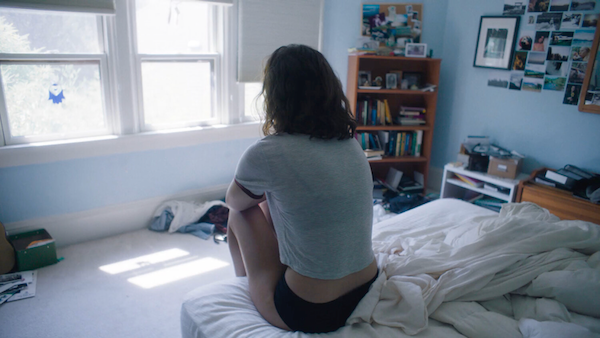Movie review by Greg Carlson
Cousins and co-writers Jessica Barr (who also plays the lead) and Jessie Barr (who also directs) build a thoughtful and sensitive coming of age drama in “Sophie Jones,” which made its world premiere this past autumn as part of the 2020 Festival du Cinéma Américain de Deauville. The movie is now available to rent from the major streaming services and should not be missed by fans of personal, low-budget, indie storytelling. Braiding together themes of grief and sexual experimentation, the Barrs confidently operate with enough self-awareness to offset any tendency toward overplaying the heavy melodrama that comes with a story about a teenager figuring out how to move forward following the death of a parent.
Jessica Barr’s Sophie is smart and sympathetic, despite the snark, sarcasm, and cruelty she sometimes directs toward her dad Aaron (Dave Roberts), sister Lucy (Charlie Jackson), and best friend Claire (Claire Manning). We have to guess how salty she might have been before she lost her mom, but the filmmakers make clear that some of Sophie’s behavior is a coping mechanism. Jessie Barr favors intimate handheld photography — beautifully realized by Scott Miller — that brings the viewer in close to the action without necessarily climbing completely into Sophie’s head. The young director has a sophisticated command of how much to make explicit and how much to withhold.
The ambiguity, confusion, and self-doubt of the protagonist contrast with the quotidian routines surrounding mealtimes, drama rehearsals, and homework. Sophie seeks out opportunities for intimacy with a small number of boys. Her choices, not always wise from the perspective of an older viewer, feel completely authentic to the character. Sophie’s grief exists in proximity to the things she does in response to her pain. Only in rare instances does she allow herself to be unguarded and vulnerable to others. When those moments take place, the Barrs approach an almost transcendent expression of the line marking the public/private self.
Faced with the unthinkable, Sophie uses trial and error like anyone in her situation. In some instances, desperation creeps past her well-polished armor. She longs to more easily integrate into a certain clique, fights with Claire, and breaks protocol by asking to sit with Lucy and friends at lunch. Yet one of the most carefully examined dimensions of the story is the way Sophie doesn’t care, or pretends not to care, about social constructions like her “reputation.” Both of the Barrs refrain from passing judgment on Sophie, and their expression of grace and forgiveness invites the viewer to offer the same courtesy.
Those who have faced tremendous or even overwhelming emotional hurricanes following the death of a close friend or family member will appreciate the movement of time in “Sophie Jones.” Even though many scenes at first appear to be communicated as self-contained vignettes, the Barrs have a deliberate strategy. They opt out of flashbacks and play with the passing days, weeks, and months, expanding and contracting Sophie’s experiences without constantly orienting the viewer to a traditional progression of what might be schematically called “stages” of grieving. The film eventually offers some kind of closure, but in many ways, Sophie’s future remains acutely uncertain.
